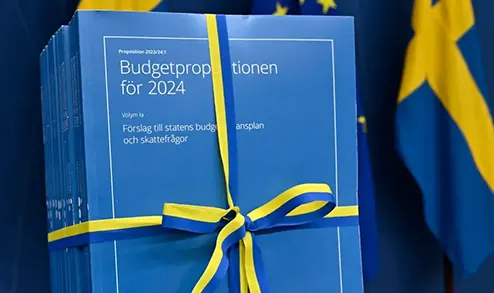 An increase of the current gambling tax rate from 18% to 22% of gross gaming revenue (GGR) is envisaged by the Sweden government. That would generate an extra SEK540.0 million ($48.4 million) of tax revenue per year. Provided that the government sanctions the proposed tax raise, it is expected to enter into force as of July 1, 2024.
An increase of the current gambling tax rate from 18% to 22% of gross gaming revenue (GGR) is envisaged by the Sweden government. That would generate an extra SEK540.0 million ($48.4 million) of tax revenue per year. Provided that the government sanctions the proposed tax raise, it is expected to enter into force as of July 1, 2024.
Gambling in Sweden is legal and regulated by the state-owned Spelinspektionen. As of January 1, 2019, Sweden abandoned the state-run gambling monopoly model and opened its market to offshore operators. Four years into the liberalization of the gambling industry, Sweden’s government believes that the industry should have already achieved balance.
In addition to the expected stabilization of the market, Sweden’s government is apprehensive about the current rate of channelization, or the proportion of properly regulated gaming. According to a report, published in March 2023 and provided by the Swedish Trade Association for Online Gambling (BOS – Branschföreningen för Onlinespel), the current channelization rate stands at merely 77%.
It is in stark contrast to the expected rate of 90% channelization, which the government said would be achieved by the proposed increase of the gambling tax rate.
According to governmental officials, the progress in terms of market stabilization and channelization over the last four years, would not be affected by the proposed tax increase. The additional tax revenue would be directed toward the financing of various government activities.
Furthermore, as of July 1, 2023, the Parliament adopted new measures to curb illegal gambling and match-fixing. As per the amendment to the Gambling Act (2018), all legal gambling operators are supposed to cooperate with Sweden’s Police Authorities in their fight against gambling-related offenses. This would eventually promote a fair and transparent relationship between the license holders and the law enforcement authorities.
BOS Expresses Concerns Over Planned Tax Increase
The unveiled plans did not remain unnoticed by BOS, the Swedish Trade Association for Online Gambling. Gustaf Hoffstedt, the organization’s Secretary-General, immediately expressed his concerns over the tax increase. He disapproved of the proposal insisting that the government should reevaluate it.
As already mentioned, the report by BOS revealed the rate of current market channelization stood at 77%. The report indicated that some gambling verticals, such as online casinos, showed market channelization as low as 72%.
The Secretary-General went on to add that this rate might decrease even more if the proposed tax rate of 22% came into effect. It would eventually reduce the market channelization to levels valid before Sweden liberalized its gambling market in 2019.
The current gambling tax rate of 18% is already comparatively higher compared to other EU countries. All in all, the governmental proposal is yet to be discussed.